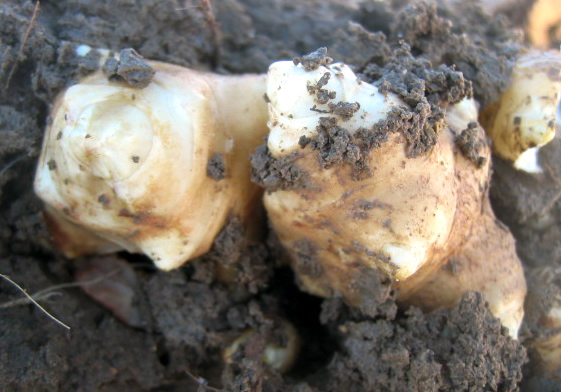Prebiotics: Difference between revisions
Jump to navigation
Jump to search

(inserted image) |
mNo edit summary |
||
| (One intermediate revision by the same user not shown) | |||
| Line 1: | Line 1: | ||
[[File:5730-sunchokes-copy.jpg|561px|thumb|right| The [[Jerusalem Artichoke]] contains high levels of inulin in their roots.]] | [[File:5730-sunchokes-copy.jpg|561px|thumb|right| The [[Jerusalem Artichoke]] contains high levels of inulin in their roots.]] | ||
From Wikipedia: " | From Wikipedia: "P''rebiotics are substances that induce the growth or activity of microorganisms (e.g., bacteria and fungi) that contribute to the well-being of their host. The most common example is in the gastrointestinal tract, where prebiotics can alter the composition of organisms in the gut [https://en.wikipedia.org/wiki/Microbiome microbiome]. | ||
As the role of the microbiome is better understood, prebiotics as well as [https://en.wikipedia.org/wiki/Probiotics probiotics] can be useful tools for the management of microbial populations in livestock. The maintenance of a beneficial microbiome may result in benefits to animal health, less stress, faster growth, less need for antibiotics, less odor, and even potentially better composting." | As the role of the microbiome is better understood, prebiotics as well as [https://en.wikipedia.org/wiki/Probiotics probiotics] can be useful tools for the management of microbial populations in livestock. The maintenance of a beneficial microbiome may result in benefits to animal health, less stress, faster growth, less need for antibiotics, less odor, and even potentially better composting."'' | ||
==Sources== | ==Sources== | ||
*inulin (sources: [[Jerusalem Artichoke]], chicory, dandelions, onions, etc.) | *inulin (sources: [[Jerusalem Artichoke]], chicory, dandelions, onions, etc.) | ||
*ginger | *ginger | ||
* | |||
==Related Pages on this Wiki== | |||
*[[Fermentation]] | |||
*[[Silage]] | |||
==Links== | ==Links== | ||
Latest revision as of 12:48, 5 May 2016

The Jerusalem Artichoke contains high levels of inulin in their roots.
From Wikipedia: "Prebiotics are substances that induce the growth or activity of microorganisms (e.g., bacteria and fungi) that contribute to the well-being of their host. The most common example is in the gastrointestinal tract, where prebiotics can alter the composition of organisms in the gut microbiome. As the role of the microbiome is better understood, prebiotics as well as probiotics can be useful tools for the management of microbial populations in livestock. The maintenance of a beneficial microbiome may result in benefits to animal health, less stress, faster growth, less need for antibiotics, less odor, and even potentially better composting."
Sources
- inulin (sources: Jerusalem Artichoke, chicory, dandelions, onions, etc.)
- ginger